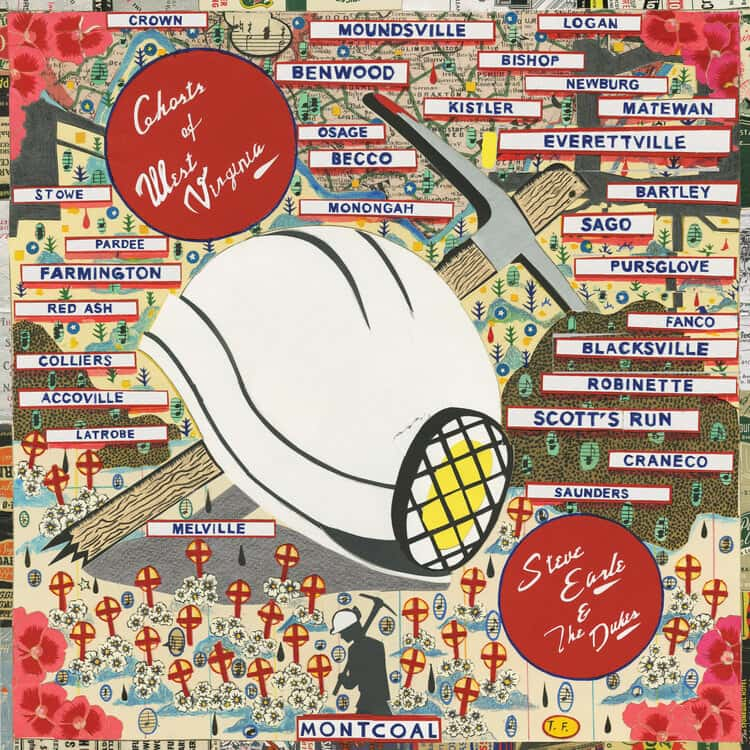'Ghosts Of West Virginia' Review: Steve Earle & the Dukes paint moving country-rock portraits of departed souls

Human existence is complex. In order to eke out a living and a meager hand-to-mouth existence, a lot of people have been forced to brave some rather inhumane, grisly conditions on this planet. And human history is marred by the horror stories of people who have suffered the brunt of the mining industries. Amongst the many tragedies that have ravaged the coal mining community, it was the 2010 explosion at the Upper Big Branch coal mine in West Virginia that became the basis of the play 'Coal Country' by documentary playwrights Jessica Blank and Eric Jensen. Labeled as one of the worst mining disasters in American history, it claimed the lives of 29 men, and investigations revealed hundreds of safety violations that had been brushed under the rug. The mine owners eventually agreed to pay out $200 million in criminal liabilities, and the mine was shut down.
Having previously worked with the celebrated country-rock outlaw Steve Earle in 2000, Blank and Jensen felt Earle’s gruff-yet-tender musical sensibilities would be a great fit for 'Coal Country', their soul-stirring narrative of the 29 miners and the numerous other lives affected by the Upper Big Branch explosion. Most of the music that Earle created for the theater project eventually ended up on 'Ghosts Of West Virginia', the latest evocative concept album by Americana stalwarts Steve Earle and the Dukes, which releases on May 22.

Looking back, Steve says, “I came to New York to make music for theater, and it’s taken a long time. Theater is a powerful thing. It’s my favorite art form.” While the play was being shown, Steve would be present on stage, guitar in hand, his evocative music being as much of the story as the playwrights' words. This passion for theater and a long history of true-blooded American songwriting has resulted in one of Earle's best works in his long and illustrious career, right up there with 'The Hard Way, 'The Revolution Starts Now', 'Transcendental Blues' and 'Copperhead Road'.
'Ghosts Of West Virginia' begins with the dirge-like spiritual 'Heaven Ain’t Going Anywhere'. The track is a celebration of the strength and stoicism of the average coal miner, and paints a picture of the struggles and simple aspirations of those who have spent their lives working in the coal mines. The fact that it's acapella only adds to the very human-centric essence of the piece. "Work all day so I sleep alright / Raise a little hell on a Saturday night / I reckon Heaven ain’t goin’ nowhere."
The next track is standard country fare and definitely a single for the airwaves. 'Union, God And Country' is an ode to the three things that traditional miners would cherish and hold dear to their hearts. Singing of those that lived the mining life with a sense of reverence, Earle paints an idyllic slice of rural American livelihoods. "Union, God and country was all they ever knew / West Virginia gold and blue."

'Devil Put The Coal In The Ground' is a song about ”hillbilly mindfulness”, as Earle puts it. A rollicking, driving, country romp, this song is a proud take on life in the coal mines. The defiant lyrics are also reminiscent of old gospel tunes - "The Devil put the coal in the ground / Said I double-dog dare ya to follow me down." As Earle explains, “The guy in that song is a miner and he’s being real about what he’s doing.”
Earle then sneaks in a nice groovy tune with 'John Henry Was A Steel Drivin Man'. A country folklore ballad based on the real-life John Henry, it tells a story of a time when traditional miners were often romanticized and respected, much before the advent of modern mechanical mining. While it does take the occasional step into the bleak and hyper-real, this track is definitely a feel-good finger snapper.
'Time Is Never On Our Side' was inspired by the four-day-long wait that the families of the 29 miners had to endure, based on the false hope that footprints discovered deep in the mines reportedly belonged to the dear departed souls they lost in the explosion in 2010. “And good things come to those who wait... Whoever told you that one lied,” sings Earle with a chuckle that may as well be a heavy sigh. Steve Earle and the Dukes give this haunting song a moving hymn-like mood, a tribute to their stellar musical capabilities.
With the rousing 'It’s About Blood', Earle pulls no punches. The emotional song features a shout-out to all 29 miners that perished that fateful day, as Earle beautifully laments the unspoken misery that such tragedies bring. It also boldly speaks of the sacrifices made by the families of these heroic coal miners. "It’s about fathers / It’s about sons / It’s about lovers / Wakin’ up in the middle of the night alone / It’s about muscle / It’s about bone / It’s about a river running thicker than water 'cause / It’s about blood."
The Dukes’ violinist and mandolin player, Eleanor Whitman, takes on vocal duties for the next yearning track, 'If I Could See Your Face Again'. In long-standing country music tradition, this song has Eleanor sing about the tribulations of a woman who has lost so much because her life was intertwined with that of her miner husband. As the title implies, she longs for someone she has lost to return, a sentiment that many like herself would share in such communities. It also features some brilliantly crafted lyrics like - "If I could touch you one more time / Just to hold your hand in mine / I’d never let it go again, I promise / And maybe we would find a town / Where dreams aren’t buried underground / And not so many ghosts around to haunt us."
'Black Lung', their next sprightly track, sounds and feels right at home with Les Claypool's bluegrass work on 'South Park'. Both catchy and wry, while containing vivid lyrics like “Every breath I take, like a 12 round fight,” the song paints a first-person narrative of the thousands of lives affected by coal workers' pneumoconiosis, an affliction that severely debilitates the lungs. Despite its bleak subject matter, the song is still infectious, if you'll pardon the pun.
With their next song, 'Fastest Man Alive', Steve Earle and the Dukes pay their respects to the legendary pilot and West Virginia native, Chuck Yeager, who was famously known for breaking the sound barrier in his Bell X-1 aircraft. In this blues-rock tinged affair, Earle almost emulates a country-bred Bob Dylan by way of 'Subterranean Homesick Blues'. Another folklore-styled piece, Earle and the Dukes present a paean to Yeager’s noble exploits in the sky, miles above the deep, dark cavernous mines that fill the rest of the album’s narrative.
We close with what feels like Earle’s most personal song on this album. Titled 'The Mine', it's a traditional Americana yarn that manages to break your heart with its sweet simplicity. It's about a man who is futilely reassuring the woman that he loves that their lives are about to change, because his brother is about to get him a job at the mine... and we all know how that ill-fated story ends, don't we? Along with 'If I Could See Your Face Again', this song about doomed lovers paints a vivid picture while violently-yet-gently pulling on your heartstrings and tear ducts.

With most of the tracks on 'Ghosts Of West Virginia' being personal, lyrical accounts and vivid stories of the coal mining community, this concept album is best experienced while heard in its entirety. “If I’d never been down in a coal mine, I’da lived a lot longer. Hell, that ain’t a close call. But then again, I’da never had anything. And half a life is better than nothin’ at all.” These lines from the song 'Black Lung' perfectly sums up everything Steve Earle feels he needs to say on this album. It's an emotional, empathetic album about loss, heartbreak, pride, honest labor, faith, sacrifices, conviction, and humanity in the face of tragedy. With this beautiful collection of songs, Steve Earle and the Dukes reinstate themselves as some of the best Southern rock storytellers of our modern era.










